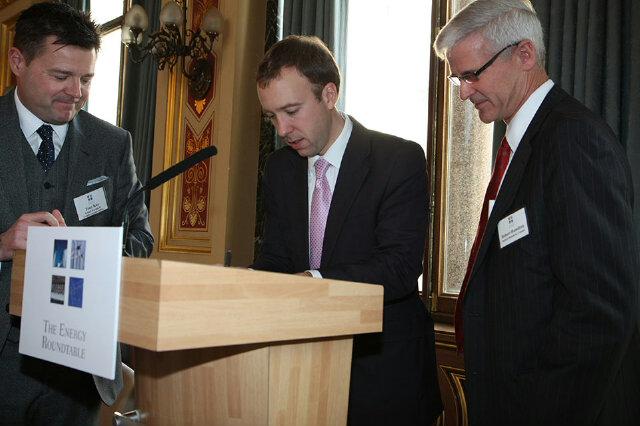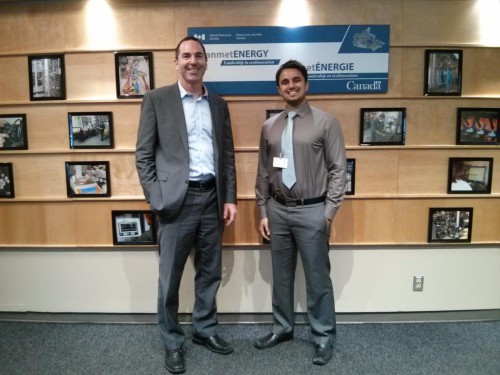27th November 2014 Calgary, Canada
UK & Canada Continue to Move Ahead Together on Carbon Capture & Storage

Canada shares the UK’s view on the importance of carbon capture and storage (CCS) in reducing GHG emissions, and has invested heavily. As coal and oil & gas continue to be strongly used here, as well as in much of the world, CCS is a key technology in the mix of approaches to mitigate global warming and fight against the 2deg Celsius increase. The IPCC estimates that the cost to meet GHG requirements to limit global warming could more than double if CCS technology is not deployed. As with any innovation, strong collaboration is an effective tool to move forward on this technology and the UK and Canada are key partners. Since the 2008 UK-Canada Joint Statement on CCS, the UK Science and Innovation team has been working hard to build these relationships through diverse stakeholders to help both our countries productively engage climate change issues. This has attracted prominent UK visitors, such as Sir Mark Walport (UK Government Chief Scientific Adviser) who visited the Shell Quest site, as well as the UK Parliamentary Select Committee on Energy & Climate Change who visited Ottawa, SaskPower’s Boundary Dam and the Shell Quest project to support their CCS inquiry. October and November continued to be eventful months in the UK-Canada CCS story.
October was a big month for CCS in Canada, and the UK was right there. In October we witnessed SaskPower launch the largest post combustion capture system at scale in the world, reducing emissions from a coal-fired power generation unit by 90%. Sat at the SaskPower CCS Symposium with Ashley Ibbett (Chief Executive of UK Office of CCS), Jon Gibbins (Director of UK CCS Research Centre), Stuart Haszeldine (co-leader of Scottish CCS and CCS Professor at the University of Edinburgh), and Tony Kay (British Consul General – Calgary), I continued to appreciate the holistic approach to Canada-UK CCS we are pursuing. Afterwards, I found myself running to the University of Calgary for their academic workshop on geological storage of carbon hosted by the Office of VP Research in partnership with Carbon Management Canada. I have been working with the Uni versity of Calgary and University of Edinburgh to develop the world’s first joint Masters degree in CCS. Elizabeth Cannon (President of University of Calgary) recently visited the UK to sign an MoU with Prof. James Smith (VP International of University of Edinburgh) to further develop joint programs and student exchanges. Continuing the Edinburgh-Calgary connection, I accompanied Stuart Haszeldine, professor of the first CCS Masters in the UK, who spoke on a panel during a diverse day covering technical, economic and social issues. This included an interesting session with a representative from industry, environmental NGO, professor, and regulator on how CCS is communicated to the general public and local stakeholders. After a short weekend, I was off again to Edmonton to attend the EU Centre of Excellence workshop on Near Zero Emissions and CCS with a special guest, John Loughhead, new Chief Scientific Advisor to DECC. John gave a fantastic presentation to an interactive roundtable on mechanics of collaboration in this area. Regulatory and finance barriers and communication issues were also covered, along with a tour of the University of Alberta carbon storage research labs. Afterwards, the presenters throughout the day gave a public talk at the University of Alberta outlining what was discussed.
versity of Calgary and University of Edinburgh to develop the world’s first joint Masters degree in CCS. Elizabeth Cannon (President of University of Calgary) recently visited the UK to sign an MoU with Prof. James Smith (VP International of University of Edinburgh) to further develop joint programs and student exchanges. Continuing the Edinburgh-Calgary connection, I accompanied Stuart Haszeldine, professor of the first CCS Masters in the UK, who spoke on a panel during a diverse day covering technical, economic and social issues. This included an interesting session with a representative from industry, environmental NGO, professor, and regulator on how CCS is communicated to the general public and local stakeholders. After a short weekend, I was off again to Edmonton to attend the EU Centre of Excellence workshop on Near Zero Emissions and CCS with a special guest, John Loughhead, new Chief Scientific Advisor to DECC. John gave a fantastic presentation to an interactive roundtable on mechanics of collaboration in this area. Regulatory and finance barriers and communication issues were also covered, along with a tour of the University of Alberta carbon storage research labs. Afterwards, the presenters throughout the day gave a public talk at the University of Alberta outlining what was discussed.
 On Tuesday 18 November Ministers and industrial leaders from Europe and Canada came together to discuss advances in conventional and unconventional oil and gas production, energy security considerations, export opportunities and the application of low carbon technologies including CCS. Mike Monea, President, Carbon Capture and Storage Initiatives, SaskPower, spoke on the recent entry into operation of Boundary Dam’s CCS power plant. Just the day before, Mike participated in a series of meetings, including with DECC, CCS Association, Energy Technologies Institute, and delivering a public talk at Imperial College in partnership with the UK CCS Research Centre. During the Summit Matthew Hancock, Minister of State for Energy, signed a Joint Statement of Cooperation on CCS with Deputy Minister Bob Hamilton of the Department of Natural Resources, Canada. The Statement will improve cooperation on research and innovation, knowledge sharing and international engagement, as well as furthering relationships between the UK and Canada. On the other side of the ocean, I spent the day with Natural Resources Canada, including touring the CanmetENERGY CCS research facilities in Ottawa and meeting CCS federal-level policy leaders. It was a day that certainly enhanced the already strong CCS relationship between the UK and Canada with a look forward to what’s next.
On Tuesday 18 November Ministers and industrial leaders from Europe and Canada came together to discuss advances in conventional and unconventional oil and gas production, energy security considerations, export opportunities and the application of low carbon technologies including CCS. Mike Monea, President, Carbon Capture and Storage Initiatives, SaskPower, spoke on the recent entry into operation of Boundary Dam’s CCS power plant. Just the day before, Mike participated in a series of meetings, including with DECC, CCS Association, Energy Technologies Institute, and delivering a public talk at Imperial College in partnership with the UK CCS Research Centre. During the Summit Matthew Hancock, Minister of State for Energy, signed a Joint Statement of Cooperation on CCS with Deputy Minister Bob Hamilton of the Department of Natural Resources, Canada. The Statement will improve cooperation on research and innovation, knowledge sharing and international engagement, as well as furthering relationships between the UK and Canada. On the other side of the ocean, I spent the day with Natural Resources Canada, including touring the CanmetENERGY CCS research facilities in Ottawa and meeting CCS federal-level policy leaders. It was a day that certainly enhanced the already strong CCS relationship between the UK and Canada with a look forward to what’s next.
 Based in Calgary, I get to engage with an array of stakeholders, from industry to government to academics, where the future of energy is on their mind. While the emissions in Western Canada continues to be a large and complex issue with strong oil & gas culture and federal/provincial approaches, we are keenly putting the UK into the bilateral (and multilateral) low carbon opportunities. We continue to develop UK-Canada collaborations in carbon capture and storage through policy, commercial or technical R&D approaches. Through garnering these strong relationships on either side of the ocean, particularly with industry and academia, we are starting to realize the commercial and knowledge economy benefits and slowly push the needle towards climate-related science and technologies. With the recent signing of the renewal of the UK-Canada Joint Statement on CCS, I look forward to what’s ahead as we are just getting started!
Based in Calgary, I get to engage with an array of stakeholders, from industry to government to academics, where the future of energy is on their mind. While the emissions in Western Canada continues to be a large and complex issue with strong oil & gas culture and federal/provincial approaches, we are keenly putting the UK into the bilateral (and multilateral) low carbon opportunities. We continue to develop UK-Canada collaborations in carbon capture and storage through policy, commercial or technical R&D approaches. Through garnering these strong relationships on either side of the ocean, particularly with industry and academia, we are starting to realize the commercial and knowledge economy benefits and slowly push the needle towards climate-related science and technologies. With the recent signing of the renewal of the UK-Canada Joint Statement on CCS, I look forward to what’s ahead as we are just getting started!